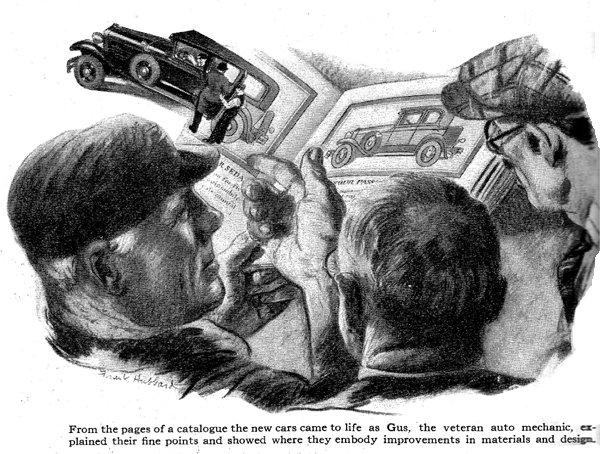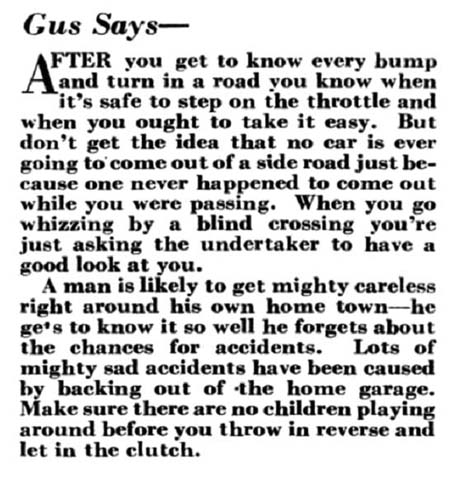December 1929

"Got time to reline my brakes this morning, Gus?"Kellogg called as he drove up to the Model Garage. "The linings are nearly worn through."
"Sure thing!" Gus Wilson replied as he swung the doors open, "Run her inside over near the bench."
Kellogg was rated as a good customer at the Model Garage. He handled his car carefully and intelligently, appreciated painstaking repair work, and, as Joe Clark, Gus's partner, once remarked, "He pays his bills instead of filing them in the waste basket!"
"Do a good job now, Gus," Kellogg instructed while the veteran auto mechanic laid out his tools and placed the jacks, "I like to be able to stop quick and, believe me, when the brakes are right on this bus she'll pretty near throw you through the windshield. I'd like to see any four-wheel brake car stop any quicker."
Gus smiled, "Guess you don't think much of four-wheel brakes," he observed.
"I should say not!" Kellogg snapped. "They're just a talking point to help 'em sell the junk they call automobiles these days. If you want to see a real automobile, take a look at this boat. No fool fancy business. Just plain good automobile."
"You've had five years of fine service out of it," Gus admitted. "Taking care of it the way you do, you ought to get thousands of miles more before it's really worn out. By the way," he suggested, "would you like to look over the catalogues of some of the new cars while you're waiting? Joe has a few on his desk. Hey! Joe!" he called to his partner, "bring out that batch of catalogues I saw you looking at this morning."
Joe popped out of his tiny office with a handful of gaily-colored literature. "Thinking of buying a new boat, Mr. Kellogg?" he grinned.
"Nix!" Kellogg snorted disdainfully, "I don't think any of the cars they make now are as good as the one I've got. I'm satisfied with it."
"I don't wonder," said Gus as he measured a piece of brake lining and cut it to the proper length, "that you think four-wheel brakes don't amount to much. Lots of cars are running on the road with four brakes in such rotten shape they won't stop the car as quick as two brakes that work right. But if you ever happen to get behind some bird who has good brakes and he gets into a tight place and he has to jam 'em on, you're going to slam into him sure as fate."
"Maybe so," Kellogg admitted, "But how about these four-speed transmissions? "Seems like a lot of bunk to me. What's the good of four speeds if you drive in high nearly all the time anyway?"
"It isn't the four speeds that count so much as the fact that you get what amounts to two high speeds," Gus explained. "Lots of times when you're boiling along a fine road at a good clip you kind of wish the motor wasn't turning over so fast it sounded like a bumblebee. Then when you get stuck in a lot of traffic or you have to push over steep hills and through lots of mud, you wish that high wasn't quite as high and second wasn't quite as low and noisy. The right kind of four-speed transmission takes care of both cases. In high, at high speed, the motor is as quiet as a mouse. In third you can crawl through traffic or plough up muddy, steep hills as easy as rolling off a log -- and do it without any gear noises either. On long trips the higher gearing saves gas, too,"
"If a four-speed transmission will do that," said Kellogg, "I'm all for it. What about this front wheel-drive idea?"
"Sounds like hot stuff in some ways," Gus observed. "Of course it's so new that you can't tell how it will work out for a while yet. There's no doubt driving through the front wheels makes it possible to get the body down close to the ground. The car ought to ride easier. Taking weight off the rear axle should help. I can remember years ago how smooth riding the old chain drive cars were. They had a light rear axle, too. But as far as that goes, there's nothing to stop 'em from getting the same light rear axle with the ordinary rear drive by fastening the differential gear case onto the frame and driving the wheels through universal jointed shafts as they do with the new front drives.
"Skidding should be less with the front drive and it is great for climbing out of ruts. Then there's no long propeller shaft to cause vibration if it doesn't happen to be balanced right."
"You don't seem to be over-enthusiastic about the front drive," said Kellogg.
"I said it looks good in a lot of ways," Gus replied. "But what looks good doesn't always work out in practice. Nobody can say for sure until a couple of thousand cars have seen a few years on the road in the hands of all sorts of drivers. Of course the idea isn't really new. Twenty-five years or more ago there used to be some electric hansom cabs running around the city streets that drove with the front wheels and steered with the back ones. Seems to me the ideal way to drive would be through all four of the wheels.
Kellogg silently thumbed through the catalogues for a while and then he popped another question. "What is a down-draft carburetor, Gus?" he asked.
"That's the latest, "Gus replied. "The air flows down through the carburetor into the cylinders, instead of uphill. The air doesn't have to lift the gas particles uphill and the air velocity can be a lot lower. That allows a larger opening through the carburetor, which means more power at high speed and still the mixture is right when the throttle is nearly closed. If they put the same big air passage to the ordinary carburetor to get the same top speed, the air would go through so slow when the engine was throttled that it wouldn't carry up enough gas. It's a swell idea. I wonder why somebody didn't think of it before?"
"Humph!" grunted Kellogg, "Maybe the new cars have more power, but what have they done to make 'em last longer? I'll bet a new car wouldn't give me the service I've gotten out of this boat."
"Well, let's see, "Gus rambusted, "First off, they're doing a better job of making cylinder castings now than they used to. The new nickel-iron always wear better than the old gray iron castings. Also, they know more about how to design a cylinder bock so the cylinder walls won't warp out of round as bad as they sometimes did in the old days. Then there's the crank shafts -- they're grinding 'em more accurately and balancing 'em a lot better. Pistons are lighter; so are connecting rods. All that means less vibration, and less vibration means less wear.
"All the good cars now have thermostats to control the water temperature. The motor heats up quicker and even a careless driver can't run 'em much too cold in winter. There's less crank case dilution to spoil the oil's lubricating qualities and the oil filters they're fitting keep the oil clean. Air cleaners keep dust out of the cylinders, and that cuts down the carbon quite a bit. Higher compression means better economy.
"As for looks, the modern lacquer finishes stand up three times as long as the old paint finish, and the chromium plating on the bright parts stays bright without polishing."
"Gosh!" Kellogg exclaimed, "I thought all that stuff was just talking points. But even if it is free, how about the bodies they're putting on the cars these days? They look pretty light and tinny to me. The body on my car is better right now than most of the bodies on the new cars."
"That isn't a fair comparison," Gus objected, "I think the bodies they're fitting now are remarkable considering the price. You can't expect a fine hand-built coach job for a hundred dollars or so. It costs that much for the good upholstered chair from a furniture store. If you want to pay the price you can get as fine a body as you ever could in the past. Your car cost a lot of jack. You can get as good a body for less today."
When the brakes had been fixed and adjusted to Kellogg's satisfaction, he smiled rather sheepishly. "Mind if I keep these catalogues for a day or two?" he said. "I've kind of a notion I'll go the rounds with this old war horse and see what they'll allow me on a trade in."
END
L. Osbone 2019
